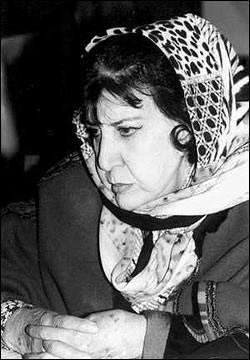Simin Behbahani
|
 |
|
Simin Behbahani
Photo by: Masoud Soheili
|
Simin Behbahani (Khalili) was
born in 1927 in Tehran, Iran, of literary parents. Her father, Abbas Khalili,
writer and newspaper editor, had tens of publications to his credit. Her mother,
Fakhr Ozma Arghoon (Fakhr Adel Khalatbari), was a noted feminist, teacher,
writer, newspaper editor, and a poet.
Simin began writing poetry at the age of fourteen and published her first poem
at same age. She used the "Char Pareh" style of Nima, a renowned poet of Persian
history, and subsequently, turns to "Ghazal", a free flowing, and poetry style
similar to the Western "Sonnet". She contributed to a historic development in
the form of the "Ghazal", as she added theatrical subjects, and daily events and
conversations into this style of poetry.
The Ghazals of Simin Behbahani are a unique style, which defines her as a one
and only, and well distinguished in her style of poetry. Simin Behbahani has
expanded the range of traditional Persian verse forms and produced some of the
most significant works of Persian literature in the twentieth century.
She was nominated for the Nobel Prize in Literature in 1997, She was also
awarded a Human Rights Watch-Hellman/Hammet grant in 1998, and similarly, in
1999, the Carl von Ossietzky Medal, for her struggle for freedom of expression
in Iran.
Poetical Works:
The Broken Lute [Seh-tar-e Shekasteh, 1951]
Footprint [Ja-ye Pa, 1954]
Chandelier [Chelcheragh, 1955]
Marble [Marmar, 1961]
Resurrection [Rastakhiz, 1971]
A Line of Speed and Fire [Khatti ze Sor'at va Atash, 1980]
Arzhan Plain [Dasht-e Arzhan, 1983]
Paper Dress [Kaghazin Jameh, 1992]
A Window of freedom [Yek Daricheh Azadi, 1995]
Collected Poems [Tehran 2003]
Gracefully she approached
Gracefully she approached,
in a dress of bright blue silk;
With an olive branch in her hand,
and many tales of sorrows in her eyes.
Running to her, I greeted her,
and took her hand in mine:
Pulses could still be felt in her veins;
warm was still her body with life.
"But you are dead, mother", I said;
"Oh, many years ago you died!"
Neither of embalmment she smelled,
Nor in a shroud was she wrapped.
I gave a glance at the olive branch;
she held it out to me,
And said with a smile,
"It is the sign of peace; take it."
I took it from her and said,
"Yes, it is the sign of...", when
My voice and peace were broken
by the violent arrival of a horseman.
He carried a dagger under his tunic
with which he shaped the olive branch
Into a rod and looking at it
he said to himself:
"Not too bad a cane
for punishing the sinners!"
A real image of a hellish pain!
Then, to hide the rod,
He opened his saddlebag.
in there, O God!
I saw a dead dove, with a string tied
round its broken neck.
My mother walked away with anger and sorrow;
my eyes followed her;
Like the mourners she wore
a dress of black silk
